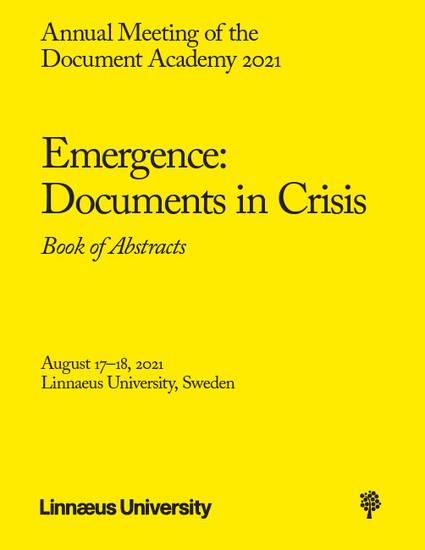
Presentation
Emergence: Documents in Crisis
Annual Meeting of the Document Academy, Linnaeus University
(2021)
Abstract
Taking advantage of the conference theme and its double entendre, in this paper I consider how documents emerge in crisis. I also consider how documents descend into crisis. Etymologies of the words crisis, emergence, and emergency, as well as their contemporary meanings, frame my discussion. The historical documents I discuss come primarily from early twentieth-century Korea. My central contention is that theorizing documents as phenomena that emerge in crisis is useful, as is theorizing how emergent phenomena we call documents descend into crisis. Theorizing documents in crisis complements documentalist theories of documentary representation suggested by thinkers like Paul Otlet and Suzanne Briet as well as neodocumentalist conceptualizations of documentality as conceived by Michael Buckland and documentarity as described by Ronald Day.
The linguistic context for my theorizing is provided by the Greek and Latin roots of the word crisis, which suggest crisis concerns “decision,” “discrimination,” and “judgement.”1 In the context provided by the conference theme, these etymologies facilitate the idea that documents are evinced as evidence of facts when there is a need to discriminate, make decisions, and pass judgements and/or during acts of judgement, decision, and discrimination. The conference theme can also be read to mean documents emerge in “states of affairs in which a decisive change for the better or worse is imminent,” the more common contemporary meaning of crisis.
Definitions of emergence and emergency sustain a reading of the conference theme that suggests documents often emerge in emergencies. They also provide a means for theorizing how documents descend into crisis. Emergence and emergency share an etymological root. Both words meant “coming forth, issuing from concealment, obscurity, or confinement” until emergency emerged in the seventeenth century to suggest emergency’s modern synonymic relationship with crisis: the idea of “junctions” “arising,” especially states of things “urgently demanding immediate action.” Documents emerge in states of affairs that demand immediate action. Emergencies for documents, we might theorize, are states of affairs when they are not brought forth to facilitate acts of discrimination and judgement and thus disappear into concealment and obscurity, a state of affairs that is also likely to be a crisis for those that might benefit from using them.
Considering how documents emerge in crisis enables us to complement Briet’s iconic discussion of an antelope as a document by investigating the crises (in both senses of the term as I have been using it) that precipitated the need to discriminate gazelle from antelope and antelope from impala and wildebeest. We can understand the documents we call Shakespeare’s plays as representations of ideas and typographic objects that inform us in line with modes of thinking promoted by Otlet’s theory of documents. But we can complement Otlet’s conceptual constructs by creating one that encourages descriptions of how Shakespeare’s plays emerge in their great diversity as documents. What emergency necessitated so many judgements about what Shakespeare may have meant? What crisis demands a decision about whether to pay 9.98 million dollars for a particular copy of Shakespeare’s plays?2 By considering documents in crisis, we can assess how documentary status and functions change as new judgements are demanded by new circumstances. The October 2020 sale of a copy of Shakespeare’s First Folio, for example, intimates how a particular document associated with Shakespeare emerged differently to decision makers at Mills College in Oakland California during a financial emergency that portended college’s closure. Mills’ decision to sell the document suggests that it had emerged as a means of addressing the college’s financial shortcomings, an emergent state that was judged to be more valuable than its status as a document with “research value to students.”3
Theorizing how documents descend into crisis we can consider the idea that documents in crisis are those that are not evinced by representations, that documents in crisis are those for which there is little evidence of them as facts. Large portions of the documentary record are undocumented, perhaps because there is no perceived emergency that requires them in processes of discrimination and judgement. Thus, they are arguably in states of affairs in which a decisive change for the better or worse is imminent. Considering these states of affairs help us to explore philosophies of evidence and suggest means of understanding notions of documentality that extend “beyond conventional documents.”4 as I hope to show with a brief discussion of conventional and less conventional documents associated with recent research conducted at the National Library of Korea concerning the transcription of historical Korean documents using deep learning technologies.
To contemplate documents in crisis is not to deny the diversity of ways that documents exist ontologically and function epistemologically. Nor does it deny the force and power they exert performatively. But the conference theme provides an opportunity to consider how documents emerge and descend as ontological and epistemological entities, representations as well as actors in performative practices that affirm, reaffirm, or rearticulate themselves and the status of entities and beings in systems and societies. Considering documents in crisis complements representational theories of documents and documentarity as a philosophy of evidence5 by providing an avenue for considering how documents are brought forth in crisis as evidence of facts during acts of discrimination, judgement, and decision and descend into obscurity otherwise. Considering documents as phenomena that emerge in crisis and disappear without it helps to describe the diverse, labile powers of documents as they emerge to perform and permit certain kinds of actions in the crises of “a changing world”6 and then fade from view to perform and permit others, or simply vanish.
Keywords
- emergence,
- emergency,
- crisis,
- deep learning,
- Korea
Disciplines
Publication Date
September, 2021
Location
Växjö, Sweden
Citation Information
Wayne de Fremery. "Emergence: Documents in Crisis" Annual Meeting of the Document Academy, Linnaeus University (2021) Available at: http://works.bepress.com/wayne-defremery/32/
